Srinagar: In a modest clinic tucked away in Srinagar’s old city, a stream of people come to see 29-year-old Basit Bashir. He’s a go-to for slipped discs and aching muscles, but more than anything, he’s the one who can make their most visible regrets disappear.
An AK-47 on an arm. A barbed wire around a wrist. Quranic verses across a chest. An ex-lover whose name lingers on a shoulder but no longer in the heart. Bashir has zapped all of it off with his laser tattoo removal gun. But he’s not beyond being occasionally outraged by what he sees.
“What shocked me the most was the vulgarity of tattoos which both men and women had got during different phases of life,” said Bashir, flashing a photo of a tattoo depicting a couple in an erotic embrace. “The more the vulgarity, the more shame is attached to showing it to others.”
Bashir claims to have removed one lakh tattoos since 2022 at his business, Valley Care Centre. But just 500 metres away, 21-year-old Ahmed Hassan of Ahmii Studio inks the desires, dreams, and defiance of college students, migrants, tourists.
“People prefer tattoos of names, Quranic verses, leaves, flowers, snakes, rifles. I get more female clients than male,” he said.
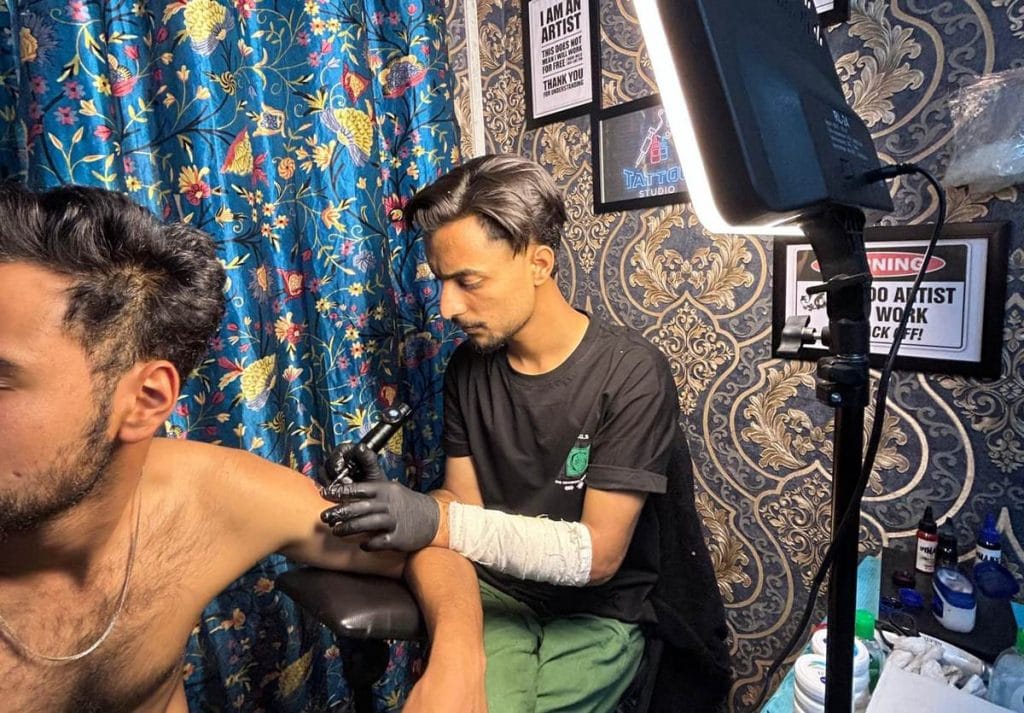
Separated by a graveyard, Bashir and Hassan are at opposite ends of the push and pull between tradition and rebellion in Kashmir. One is about expression, the other about erasure. One is about taking a leap, the other about second-guessing it.
Both clinics are small and share a similar aesthetic. Ahmii Studio has blue wallpaper with golden floral patterns, its old-world ambience offset by tattooing tools wielded expertly by Hassan, who sports a trendy haircut and ear studs. Valley Care Centre also has ornate wallpaper, red and gold this time, paired with the trappings of a modern clinic: anatomical charts, a decompression bed, laser machines.
With a neat beard and a scholarly manner, Bashir calls himself a chiropractor, reflexologist, and laser specialist. He also offers alternative therapies like hijama, or cupping, which involves placing heated cups on the skin to create suction and draw out toxins.
Every time a client enters the laser room, a soft pop-pop sound can be heard. Some clench their teeth, some shut their eyes, some lie down in stoic silence while others grunt or even cry. For some, it’s about emotional relief. For others, it’s about becoming less conspicuous in a place where there’s a heavy police presence and strict religious and moral codes.
“People do all kinds of things in the name of empowerment, but here in Kashmir it is looked down upon,” said Muskan, who handles female clients at Valley Care Centre.
For Bashir, tattoos are morally questionable. Removing them is his way of setting people on a more pious path.
Also Read: Young Kashmiri Pandit creators haven’t forgotten haak and Herath. They won’t let you either
Tattoo trouble
When 17-year-old Kupwara resident Sahil was working as a hotel server in Ludhiana, getting a tattoo seemed like the thing to do. All the other waiters had them, and he and his friends wanted in. He got an AK-47 rifle inked on his right arm.
“We saw other stewards and guests with tattoos on their arms, necks, chests, legs, and we also decided to do the same,” said Sahil, whose phone still has a picture of Punjabi singer Sidhu Moose Wala as the wallpaper.
But just two months after he got the tattoo, Sahil had to return to Kashmir. In the wake of the 22 April Pahalgam massacre, he no longer felt safe in Punjab as cases of harassment against Kashmiris in other states were being reported.
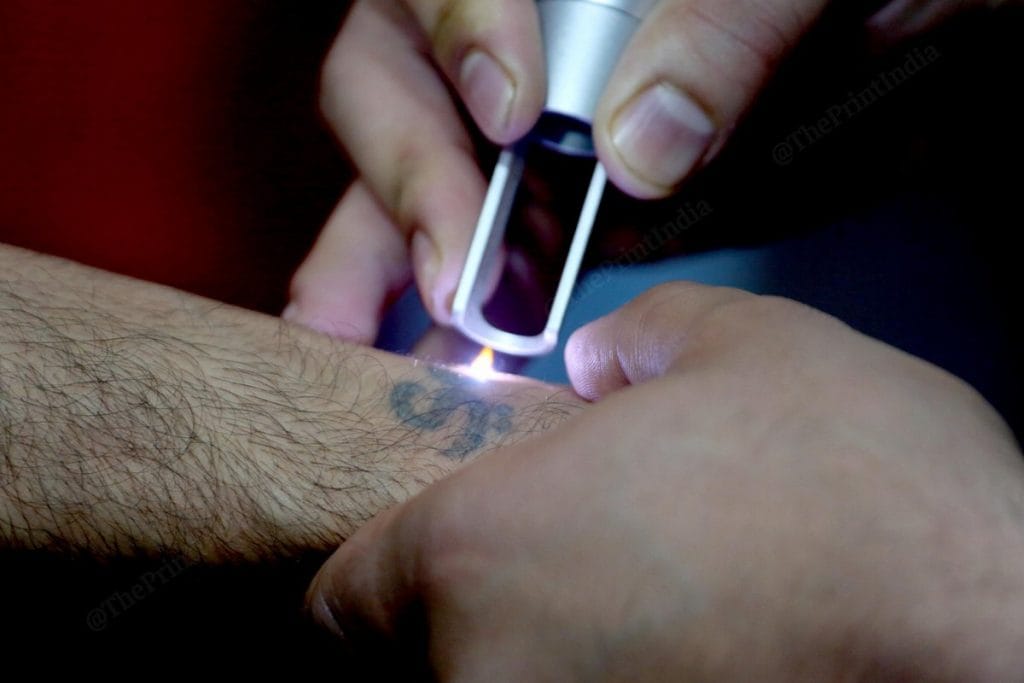
Upon his return, the tattoo quickly became a millstone. First, a police officer at a local station warned him about dire outcomes in the afterlife.
“He told me that this is totally un-Islamic, and at the time of your death, you will remain impure after the final bath,” Sahil said.
Then a few weeks later, while he was shopping in Srinagar for a wedding, some CRPF personnel spotted the tattoo.
“They kept me there for some time and asked about the reasons for the tattoo. I got very scared and then decided to have it removed,” he said.
Sahil landed up at Valley Care Centre. He was one of many who come citing everything from religious guilt and moral panic to breakups and harassment from family and security forces.
I remember we had one client who had inked her belly when she was out of Kashmir. Upon her return for her wedding, in a desperate move, she used some acid to remove it
-Muskan, Valley Care Centre employee
For Bashir, tattoos are morally questionable. Removing them is his way of setting people on a more pious path.
“This is haram—prohibited—in Islam, so people should not have it,” he said.
Even as the Kashmir Valley is seeing a surging demand for tattoos, many still view it as un-Islamic, Ahmed said. Last year, he shut his studio for a few months after receiving threats.
‘Sins’, scars, and second thoughts
The idea of removing tattoos came to Bashir in 2022 during a hijama session with a client.
“I saw ‘La Ilaha Illallah—there is none but God’ written on his arm. He felt ashamed of it and said he could not afford to remove it, as removing a tattoo is costlier than inking it. So then I decided I should do something about it,” he added.
The procedure comes with its share of penance built in. The laser gives off a sharp pop with each pulse. There’s a visible flash, and the skin turns pale—a temporary effect called frosting. It happens when tiny gas bubbles form under the skin as the ink breaks down. A single tattoo usually takes four to eight sittings to remove.
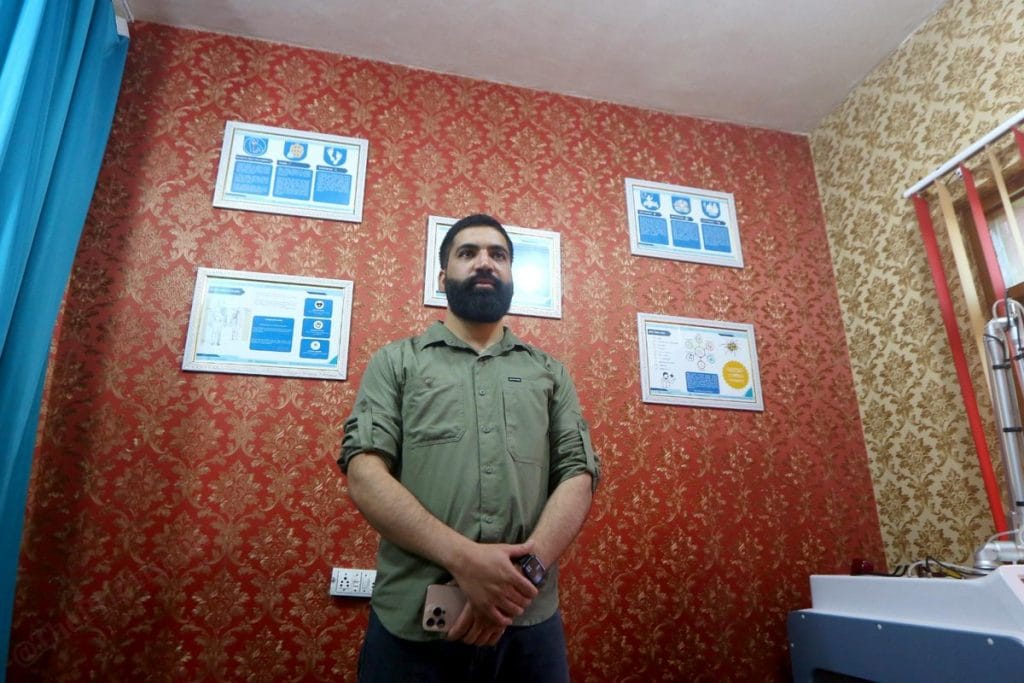
Initially, Bashir offered free tattoo removal. But as the rush grew, he began charging Rs 100 per session. He has now hiked it to Rs 400. It has added a steady income stream to a business that also includes hijama, chiropractic work, reflexology, navel displacement, sports injury care, and fire therapy.
The clinic sees both men and women. Muskan, who interns there and handles much of the administrative work, says she could not believe her eyes when she saw some of the body art.
I have seen some movies from the Harry Potter franchise and liked the character, so I inked myself. After seeing it, a lot of other people also had the same tattoo made
-Ahmed Hassan
“When you are out of Kashmir, rebelliousness makes you do things that are beyond the Valley’s conservative environment,” she added.
Women clients, in particular, tend to be more embarrassed by their tattoos and sometimes try other methods before finally coming to the clinic.
“I remember we had one client who had inked her belly when she was out of Kashmir. Upon her return for her wedding, in a desperate move, she used some acid to remove it but ended up burning her belly skin,” Muskan recounted. “When she came to us, it took us a while to work on her, but her tattoo was removed successfully.”
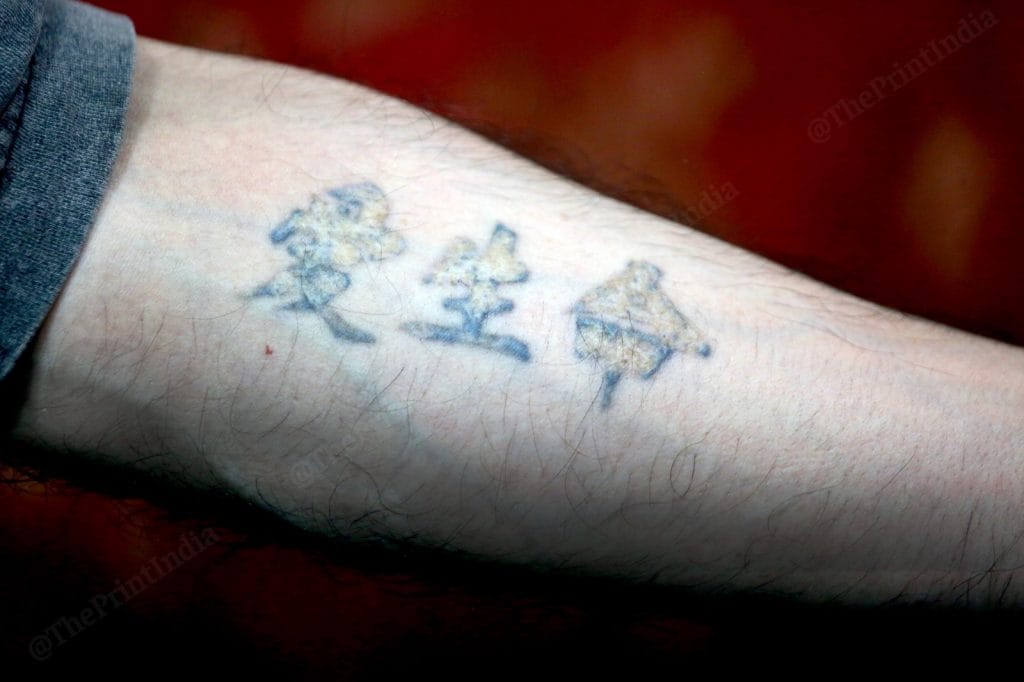
Seeing the number of women coming for the procedures, Muskan intends to start her own clinic after finishing her internship.
In the waiting area, Hilal and Ahmed from Srinagar’s Kaksarai wait for their turn. Both are getting the names of ex-girlfriends removed—from their wrist and arm, respectively. They’re on edge, having already undergone laser sessions, which are slightly painful. They are determined nonetheless.
“Let her burn in hell,” Hilal muttered to Ahmed about his ex.
Also Read: ‘Modi made our dream honeymoon possible’—couple on board the Srinagar Vande Bharat
‘I’m a natural artist’
At Ahmii Studio, clients come in with names, verses, or just a fleeting idea. Tattooist Ahmed Hassan sits with them, listens, sketches, and then gets busy.
“Most of my clients come after they see my work on social media. I check with them if they are happy with my work several times. It gives me great satisfaction seeing their fulfilled faces after getting inked,” said Hassan, who charges Rs 500 per inch for all tattoos.
But there are risks. Even as the Kashmir Valley is seeing a surging demand for tattoos, many still view it as un-Islamic, Ahmed said. Last year, he shut his studio for a few months after receiving threats.
“Back in November 2024, after a viral reel of mine, I was hounded online and later someone wrote me a letter. I don’t know if it was from militants or local people, but I ignored it. However, once when I was downstairs near my studio, I found two people in pherans following me. It was a warm day, and seeing people wearing pherans, I sensed danger. So I fled from the scene and the same evening flew to Delhi,” he added.
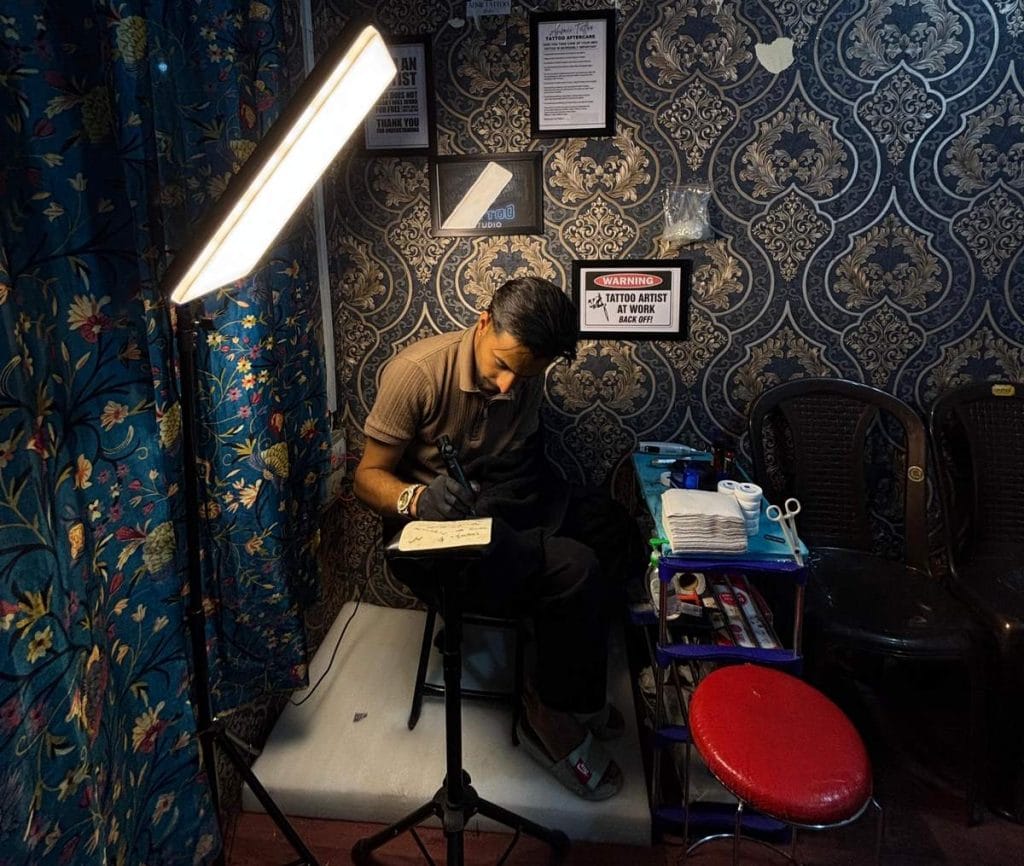
He resumed the business only this May. Tattooing isn’t something he’s willing to give up, even though he stumbled into it almost by fluke. He started out in 2023, three years after his father’s death. He was only a teenager then, but the family needed more income. With an artistic bent and no other skill, he ordered tattoo machines online and started with an Instagram page. His entire client base, he says, comes from there.
“I borrowed some money from my brother and rented a room in Jahangir Chowk to start my studio. Once I started, it never left me. My clients kept coming,” Hassan added.
Initially, it was one tattoo a day; now he does two, three, sometimes even four.
“I haven’t done any course in tattoo making. I am a natural artist,” he said proudly, adding that clients from Punjab, Delhi, the United States, and almost all the districts of Jammu and Kashmir flock to him.
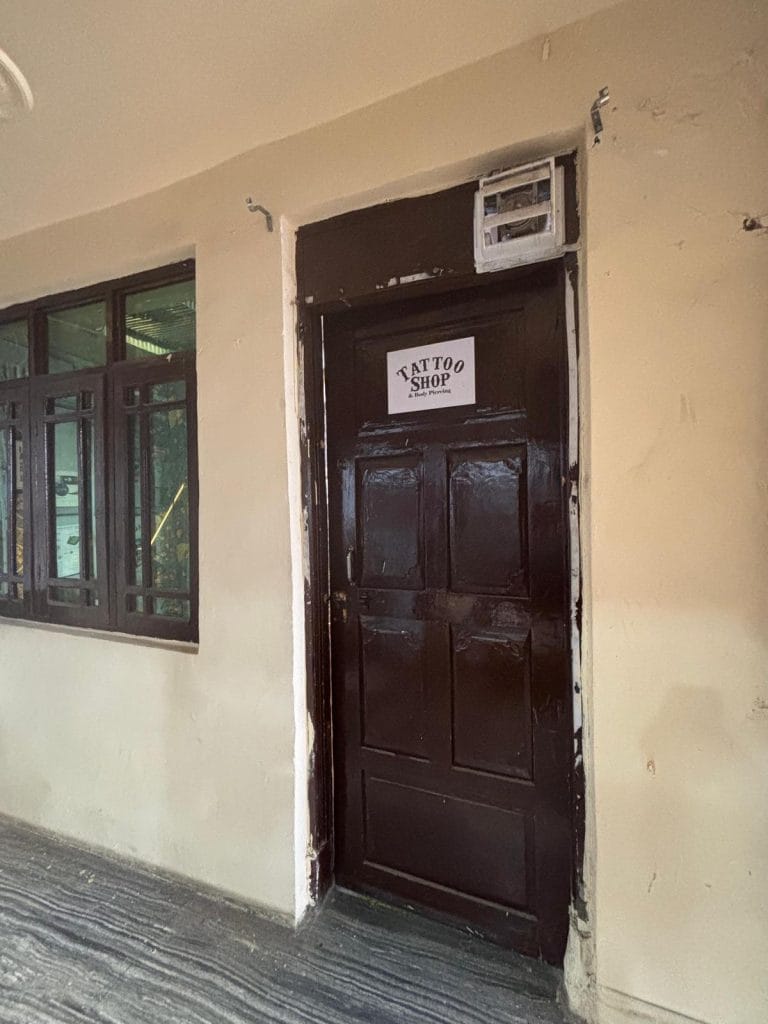
“On one occasion, a client from Thailand gave me a real diamond after seeing my work. I checked the price online. It’s worth Rs 98,000,” he said.
When he started out, Hassan was his own advertisement. He experimented on himself with multiple Harry Potter tattoos.
“I have seen some movies from the Harry Potter franchise and liked the character, so I inked myself. After seeing it, a lot of other people also had the same tattoo made from me,” he said.
He later removed them because of a skin infection, but doesn’t plan to leave his skin undecorated.
“I will make more on the scars of the old tattoos,” he said.
(Edited by Asavari Singh)



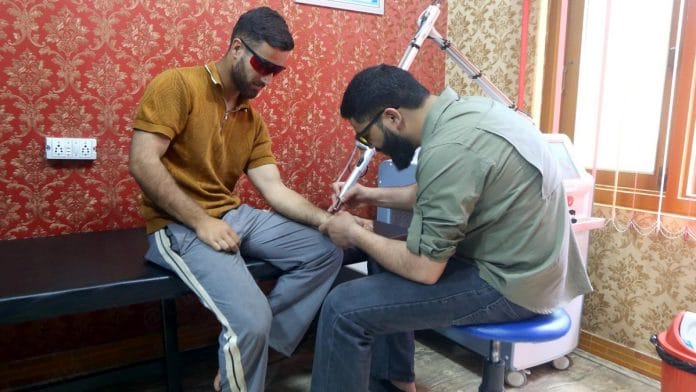



How can a tattoo be un-Islamic?
This is beyond weird. The mullahs have ruined the religion and the lives of devout Muslims.